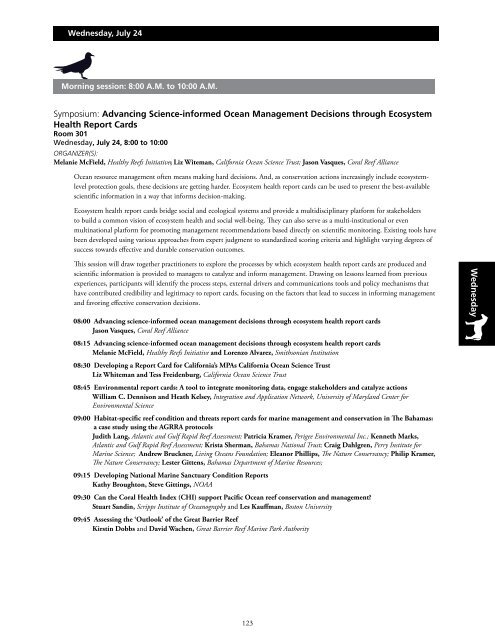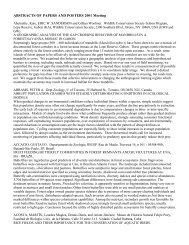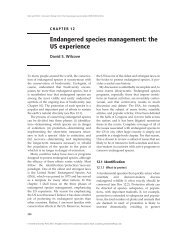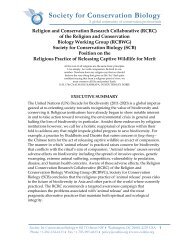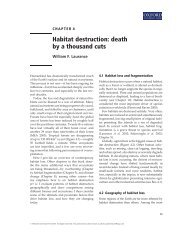ICCB 2013 Program - Society for Conservation Biology
ICCB 2013 Program - Society for Conservation Biology
ICCB 2013 Program - Society for Conservation Biology
You also want an ePaper? Increase the reach of your titles
YUMPU automatically turns print PDFs into web optimized ePapers that Google loves.
Wednesday, July 24<br />
morning session: 8:00 a.m. to 10:00 a.m.<br />
Symposium: Advancing Science-in<strong>for</strong>med Ocean Management Decisions through Ecosystem<br />
Health Report Cards<br />
Room 301<br />
Wednesday, July 24, 8:00 to 10:00<br />
Organizer(s):<br />
Melanie McField, Healthy Reefs Initiative; Liz Witeman, Cali<strong>for</strong>nia Ocean Science Trust; Jason Vasques, Coral Reef Alliance<br />
Ocean resource management often means making hard decisions. And, as conservation actions increasingly include ecosystemlevel<br />
protection goals, these decisions are getting harder. Ecosystem health report cards can be used to present the best-available<br />
scientific in<strong>for</strong>mation in a way that in<strong>for</strong>ms decision-making.<br />
Ecosystem health report cards bridge social and ecological systems and provide a multidisciplinary plat<strong>for</strong>m <strong>for</strong> stakeholders<br />
to build a common vision of ecosystem health and social well-being. They can also serve as a multi-institutional or even<br />
multinational plat<strong>for</strong>m <strong>for</strong> promoting management recommendations based directly on scientific monitoring. Existing tools have<br />
been developed using various approaches from expert judgment to standardized scoring criteria and highlight varying degrees of<br />
success towards effective and durable conservation outcomes.<br />
This session will draw together practitioners to explore the processes by which ecosystem health report cards are produced and<br />
scientific in<strong>for</strong>mation is provided to managers to catalyze and in<strong>for</strong>m management. Drawing on lessons learned from previous<br />
experiences, participants will identify the process steps, external drivers and communications tools and policy mechanisms that<br />
have contributed credibility and legitimacy to report cards, focusing on the factors that lead to success in in<strong>for</strong>ming management<br />
and favoring effective conservation decisions.<br />
08:00 Advancing science-in<strong>for</strong>med ocean management decisions through ecosystem health report cards<br />
Jason Vasques, Coral Reef Alliance<br />
08:15 Advancing science-in<strong>for</strong>med ocean management decisions through ecosystem health report cards<br />
Melanie McField, Healthy Reefs Initiative and Lorenzo Alvarez, Smithsonian Institution<br />
08:30 Developing a Report Card <strong>for</strong> Cali<strong>for</strong>nia’s MPAs Cali<strong>for</strong>nia Ocean Science Trust<br />
Liz Whiteman and Tess Freidenburg, Cali<strong>for</strong>nia Ocean Science Trust<br />
08:45 Environmental report cards: A tool to integrate monitoring data, engage stakeholders and catalyze actions<br />
William C. Dennison and Heath Kelsey, Integration and Application Network, University of Maryland Center <strong>for</strong><br />
Environmental Science<br />
09:00 Habitat-specific reef condition and threats report cards <strong>for</strong> marine management and conservation in The Bahamas:<br />
a case study using the AGRRA protocols<br />
Judith Lang, Atlantic and Gulf Rapid Reef Assessment; Patricia Kramer, Perigee Environmental Inc.; Kenneth Marks,<br />
Atlantic and Gulf Rapid Reef Assessment; Krista Sherman, Bahamas National Trust; Craig Dahlgren, Perry Institute <strong>for</strong><br />
Marine Science; Andrew Bruckner, Living Oceans Foundation; Eleanor Phillips, The Nature Conservancy; Philip Kramer,<br />
The Nature Conservancy; Lester Gittens, Bahamas Department of Marine Resources;<br />
09:15 Developing National Marine Sanctuary Condition Reports<br />
Kathy Broughton, Steve Gittings, NOAA<br />
09:30 Can the Coral Health Index (CHI) support Pacific Ocean reef conservation and management<br />
Stuart Sandin, Scripps Institute of Oceanography and Les Kauffman, Boston University<br />
09:45 Assessing the ‘Outlook’ of the Great Barrier Reef<br />
Kirstin Dobbs and David Wachen, Great Barrier Reef Marine Park Authority<br />
Wednesday<br />
123


